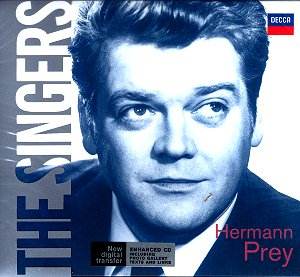This disc is one of the first twenty, issued on the
Decca label, under the generic title ‘The Singers’. The series,
with another thirty in preparation, claims to represent the artistry
of the greatest singers from first century of recording. The track selection
was made by the late John Ardoin and is somewhat idiosyncratic in the
face of the collected treasuries of DG, Philips and Decca.
These discs are more than merely sonic CDs but ‘multimedia’,
being enhanced for those with ROM facility, to include photo gallery,
biographies and texts. If you lack ROM facility you get a booklet with
brief essay and track listing, the latter lacking such basic information
as to the operatic character singing the aria! The presentation aims
to be different and unique, being a cardboard case within a plastic
slip case emblazoned ‘The Singers’
Hermann Prey, born in 1929, passed his adolescence
in wartime Berlin where he played the accordion and sang in the Mozart
Choir. He later contributed lighter fare for the occupying troops. His
good voice went along with an attractive outgoing personality and good
looks: together these brought offers of a career in popular music. However,
it was to the classical repertoire that he turned, making his operatic
debut in 1952, after which he sang in all the world’s major opera houses
and festivals. His beautiful lyric baritone was admired in Mozart (Guglielmo,
Papageno, Figaro and Count Almaviva), and Rossini (Figaro),
of which there are examples on this disc, also in Verdi (Germont
père), Rodrigo and Wagner (Wolfram).
Like his great contemporary and elder by four years,
Fischer-Dieskau, Prey’s greatest love was lieder, to which both men
brought keen intellects to their understanding and interpretations.
It is songs by the great German lieder composers that dominate the rather
meagre 64 minutes of this disc and where Prey is well accompanied by
Karl Engel. The 1962 recording is rather flat, and lacks presence.
Given the vast lieder repertoire it would be easy to
wish for this or that in exchange for what is included. Prey’s voice
is in fine condition and I was particularly taken by his singing of
Schubert’s D799 (tk 8) where his soft expressive singing is outstanding;
similarly Schumann’s Mein Rose (tk 2) is heartrending with a
lovely mezza voce, while Der Hildalgo (tk 11) could do with a
lot more weight of voice. Of the Brahms, Wiegenlied (tk 14) is
sheer magic and in die Mainacht, which follows, Prey really rises
to the heights. Given the meagre timing, 10 minutes less than the other
discs in this series, I would have liked to hear him in Wolfram to round
off this fine, brief survey of lieder superbly sung.
Of the opera extracts, the 1972 recording of Rossini’s
Barber under Abbado has Prey at his scintillating best in Largo
Factotum and in Dunque io son with Teresa Berganza. The two
extracts of his Papageno under Solti (rec. 1970) are a delight
whilst his Figaro seems somewhat lightweight when compared with the
bass baritones who have recorded the part; nor is he helped by the rather
backward balance and flat acoustic. Despite these reservations, Prey’s
sparkle and bite come across. Interestingly, the exemplary essay by
John Steane accompanying the issue finds Prey and Fischer-Dieskau complementary:
both great singers.
Robert J Farr


